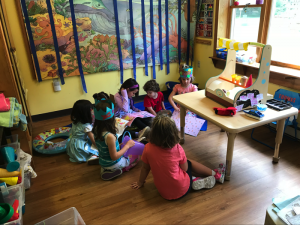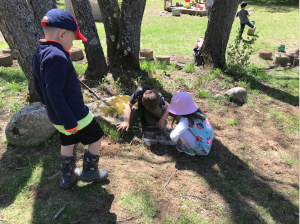The Importance of Social Emotional Learning
Attending preschool is a chance for children to begin to learn how to engage successfully in a group setting. Through the activities and opportunities offered at a developmentally appropriate preschool, the goal is that each child will gain confidence and independence as their social emotional skills increase and mature.
What is Social-Emotional Learning?
 Social learning involves understanding the guidelines and approaches for getting along with others, while emotional learning is the ability to know one’s own feelings and how to manage them.
Social learning involves understanding the guidelines and approaches for getting along with others, while emotional learning is the ability to know one’s own feelings and how to manage them.
Specifically, social emotional learning is described as the “development of the skills children need to understand and manage emotions, become self-aware and self-regulated, develop an understanding of others, create positive relationships, and problem solve.” (Getting to the HEART of Learning /Social-Emotional Skills across the Early Childhood Curriculum – by Ellen Booth Church)
In a preschool classroom where social emotional skills are a priority, one should see children who are happily engaged, are sharing and taking turns with one another, are working out conflicts (either independently or with help), and are willing to express themselves in constructive ways.
These are not small objectives, but they are so important in order to be comfortable with oneself in a group of any type. These will remain relevant for a person’s entire life.
How Do Effective Teachers Assist in the Growth of Social and Emotional Learning?
 “Helping children develop social and emotional skills is the heart and soul of any good program for young children” (Gordon & Browne 2014).
“Helping children develop social and emotional skills is the heart and soul of any good program for young children” (Gordon & Browne 2014).
Teachers support the growth of these skills for each child in a variety of ways, including:
- planning intentional activities
- coaching
- modeling
- cueing
- using children’s books
What are Important Social-Emotional Skills Preschoolers Need to Develop?
Some of the skills that are essential for children to develop as they engage in social emotional learning are:
- Becoming competent in recognizing her/his own needs
- Gaining experience and understanding in interactions with others
- Willingness to try new things and to stick with things that are challenging
- The focus necessary to solve problems effectively
- Developing the capacity to show tolerance and kindness to others – as well as to themselves
Social-Emotional Learning Sets the Foundation for Future Skill Development
Social emotional learning is critical as children mature, because this area of their development will influence all other components of their future development and behavior.
In her book, What Kids Need: Today’s Best Ideas for Nurturing, Teaching, and Protecting Young Children (2002), Rima Stone states:
“that scientific and practical lessons, including those from brain research, teach us that social and cognitive skills are linked. Many of the abilities involved in learning reading, mathematics, and other subjects are elements of social and emotional development, namely listening, talk persistence, and flexible problem solving. The best way to help young children grow into curious, confident, and able learners is to provide them with warm, emotionally secure, and positive social experiences.”
A quality preschool will offer children a safe and nurturing environment where they can begin to express themselves as an individual and in a group – all the while having opportunities for loving guidance and practice in developing social emotional learning.
At Pejepscot Day School Preschool in Topsham, ME, we believe that all children at the preschool level have something exceptional about them. Come explore what we have to offer and learn more about our preschool curriculum here on our website.

I like that you suggest that recognizing your own needs is a good skill that your child should learn in a pre k school program. My daughter is now 4 years old, and we want to find a good preschool for her to attend to prepare her for kindergarten next year. I will keep this in mind while we are looking for somewhere that meets all our requirements.